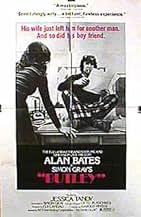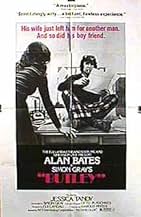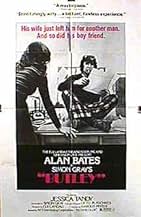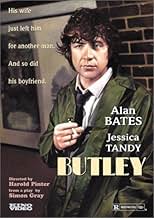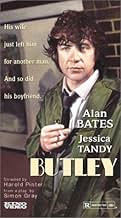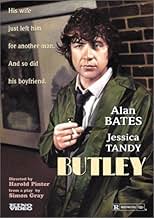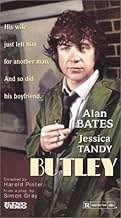An English professor finds his life crumbling around him.An English professor finds his life crumbling around him.An English professor finds his life crumbling around him.
Jill Goldston
- Tube Passenger
- (uncredited)
Lindsay Ingram
- Female Student
- (uncredited)
Anthony Lang
- Tube Passenger
- (uncredited)
Patti Love
- Female Student
- (uncredited)
Belinda Low
- Female Student
- (uncredited)
Derrick O'Connor
- Irishman in pub
- (uncredited)
John Savident
- James
- (uncredited)
Susan Wooldridge
- Female Student
- (uncredited)
Featured reviews
This American Film Theater presentation of Simon Gray's play about a bisexual professor of English whose life is in full collapse is a wordy affair. Alan Bates, in the title role, talks almost nonstop.... or perhaps I should say that he speaks. Harold Pinter directed this production like a stage play, and the performances are theatrical.
I found it impossible to work up any sympathy for Bates' character, who seems to have sabotaged his life through bad choices. Likely that was Gray's point. He taught at Queen Mary College for a quarter of a century, and this looks like an illustration of the irony that the in-fighting in academia is so vicious because the stakes are so small. Of course, these are people fighting for their lives, but they don't seem to care much for those lives, just in scoring hateful points off each other. In any case, I found the show as unpleasant as the self-absorbed characters.
I found it impossible to work up any sympathy for Bates' character, who seems to have sabotaged his life through bad choices. Likely that was Gray's point. He taught at Queen Mary College for a quarter of a century, and this looks like an illustration of the irony that the in-fighting in academia is so vicious because the stakes are so small. Of course, these are people fighting for their lives, but they don't seem to care much for those lives, just in scoring hateful points off each other. In any case, I found the show as unpleasant as the self-absorbed characters.
A movie like this works as a small-setting exercise in actor virtuosity -- Bates grabs the individual words, twirls them around, and pitches them at his enemies with a high-pitched, womanly cackle -- and it works brilliantly on that level. But it also works on a larger level of a man who uses words as an evasive tool. Of course no one really talks like this, no one is this witty, but more than just entertaining dialogue (and some of it is very funny) the writing does serve an emotional purpose. Bates' performance, as a professor who avoids his contemporaries and who tries to dig into the mind of his young male lover, is incredibly good; it's like he's tap-dancing on top of himself with the exuberant joy of performance. And I loved the smart, youthful, innocent-patient tenderness in O' Callaghan's performance as the lover he shares an office with (where the majority of the film takes place).
Butley the man can't quite be explained, even though certain facets of his personality are obvious -- he's coated in irony, yet that can't hide his failings: he's jealous of the woman who's getting published while he's not, he can't stand students who just want to learn, and he's resentful of the man stealing his boyfriend from him. But yet he desperately goes chasing after people down the hall, just to get the last word in; he almost literally hangs off the doorknob while various characters come into his office; he screeches at the top of his lungs just to see if his leaving visitor will stop and come back. Butley does so often talk in the false hypothetical -- that type of grandstanding where he mentions something abstractly that specifically refers to someone -- that at times it's difficult to pinpoint who, exactly, he's referring to. (When he talks to Reg, the man stealing his boyfriend from him, does he use words like "queer" and "fairy" intending to mock himself to shock Reg, or to mock Reg in the guise of innocently questioning him?) While I didn't quite catch all the literary references -- just about the only drawback for me -- this is one of the most satisfying movies I've seen about the handling of a dying relationship. 10/10
Butley the man can't quite be explained, even though certain facets of his personality are obvious -- he's coated in irony, yet that can't hide his failings: he's jealous of the woman who's getting published while he's not, he can't stand students who just want to learn, and he's resentful of the man stealing his boyfriend from him. But yet he desperately goes chasing after people down the hall, just to get the last word in; he almost literally hangs off the doorknob while various characters come into his office; he screeches at the top of his lungs just to see if his leaving visitor will stop and come back. Butley does so often talk in the false hypothetical -- that type of grandstanding where he mentions something abstractly that specifically refers to someone -- that at times it's difficult to pinpoint who, exactly, he's referring to. (When he talks to Reg, the man stealing his boyfriend from him, does he use words like "queer" and "fairy" intending to mock himself to shock Reg, or to mock Reg in the guise of innocently questioning him?) While I didn't quite catch all the literary references -- just about the only drawback for me -- this is one of the most satisfying movies I've seen about the handling of a dying relationship. 10/10
The American Film Theatre was a praiseworthy effort to present classic modern plays to a wide audience. The series petered out when it became clear that there was in fact not enough of an audience to make the venture viable. This left us with a group of films, or rather filmed plays, of varying quality but always interesting, if not only for the wonderful casts assembled for the series. "Butley" was one of the best. After years of oblivion, the series is finally and thankfully being released.
The problem with Simon Gray's very engaging play is that the characters are people one would hardly want to meet. They are a deeply flawed, unlikable bunch. As such we have little sympathy for any of them and hence Gray, intentionally or not, does not allow the viewer to connect emotionally with his characters. He instead allows us to watch as Ben Butley's life slowly disintegrates before our eyes. Despite the enforced detachment, it still remains a fascinating process, thanks to Pinter's precise direction, Gray's very sharp dialogue and Alan Bates delivering an astonishingly virtuoso performance.
It's one of those extremely rare performances in which the actor becomes completely engulfed by the character. It's a feat to behold; almost scary at times. This alone makes "Butley" an unforgettable experience.
The problem with Simon Gray's very engaging play is that the characters are people one would hardly want to meet. They are a deeply flawed, unlikable bunch. As such we have little sympathy for any of them and hence Gray, intentionally or not, does not allow the viewer to connect emotionally with his characters. He instead allows us to watch as Ben Butley's life slowly disintegrates before our eyes. Despite the enforced detachment, it still remains a fascinating process, thanks to Pinter's precise direction, Gray's very sharp dialogue and Alan Bates delivering an astonishingly virtuoso performance.
It's one of those extremely rare performances in which the actor becomes completely engulfed by the character. It's a feat to behold; almost scary at times. This alone makes "Butley" an unforgettable experience.
This really plays much like a filming of a play. The direction is almost minimal. That's probably for the good given that what remains is a great bit of showmanship.
Alan Bates is stunningly good as the lead Butley. He's a brilliant professor and writer at the end of his career. There is some amazing scheming between his character and younger more promising acolytes that he is jealous of.
The only reason to watch this is for the dialogue which is sharp and literate -- one wonders what became of this. The version I saw was a film version of the play. Not much of production value but the playwright's craft is still preserved. Even mentioning all of this, it's amazing how well this holds up almost 40 years later. That's probably due to Bates' bravura performance.
Alan Bates is stunningly good as the lead Butley. He's a brilliant professor and writer at the end of his career. There is some amazing scheming between his character and younger more promising acolytes that he is jealous of.
The only reason to watch this is for the dialogue which is sharp and literate -- one wonders what became of this. The version I saw was a film version of the play. Not much of production value but the playwright's craft is still preserved. Even mentioning all of this, it's amazing how well this holds up almost 40 years later. That's probably due to Bates' bravura performance.
10B24
The late Alan Bates had many "bests" (if one may be permitted to say so)because of the constant intensity he brought to every role. He made acting something of a physical sport. In this case, his neurotic Butley uses language as a fencer's epee, yielding nothing to putative antagonists in the tight confines of an English department office in a major university as the camera follows him doggedly thrusting and parrying without pause. I especially liked the puns and double entendres (obviously). This sort of thing is not for everyone, of course, and I do not blame the viewer who is easily bored by such verbal jousting.
Did I mention the superb camera work? It is a tour de force to take a stage play like this one and make it come alive on film. Great acting and great direction would be lost without due attention to the medium, and this one has it par excellence. As depressing as the theme may be, and as unlikeable the fictional characters, this production succeeds in demonstrating just how powerful a film can be in spite of itself. It reminded me instantly of "Who's Afraid of Virginia Woolf" in that regard. And it is uncanny in its recognition of all the unhappy details found in any college English department office.
The nicest touch, of course, was in making Butley a T. S. Eliot specialist, with a photo of the lugubrious poet pinned to the wall. Much comic relief if one knows how to spot it.
Did I mention the superb camera work? It is a tour de force to take a stage play like this one and make it come alive on film. Great acting and great direction would be lost without due attention to the medium, and this one has it par excellence. As depressing as the theme may be, and as unlikeable the fictional characters, this production succeeds in demonstrating just how powerful a film can be in spite of itself. It reminded me instantly of "Who's Afraid of Virginia Woolf" in that regard. And it is uncanny in its recognition of all the unhappy details found in any college English department office.
The nicest touch, of course, was in making Butley a T. S. Eliot specialist, with a photo of the lugubrious poet pinned to the wall. Much comic relief if one knows how to spot it.
Did you know
- TriviaFilm direction debut and sole film direction credit for Harold Pinter.
- Quotes
Ben Butley: I'm a one-woman man, and I've had mine, thank God.
- How long is Butley?Powered by Alexa
Details
- Runtime
- 1h 34m(94 min)
- Sound mix
- Aspect ratio
- 1.85 : 1
Contribute to this page
Suggest an edit or add missing content


